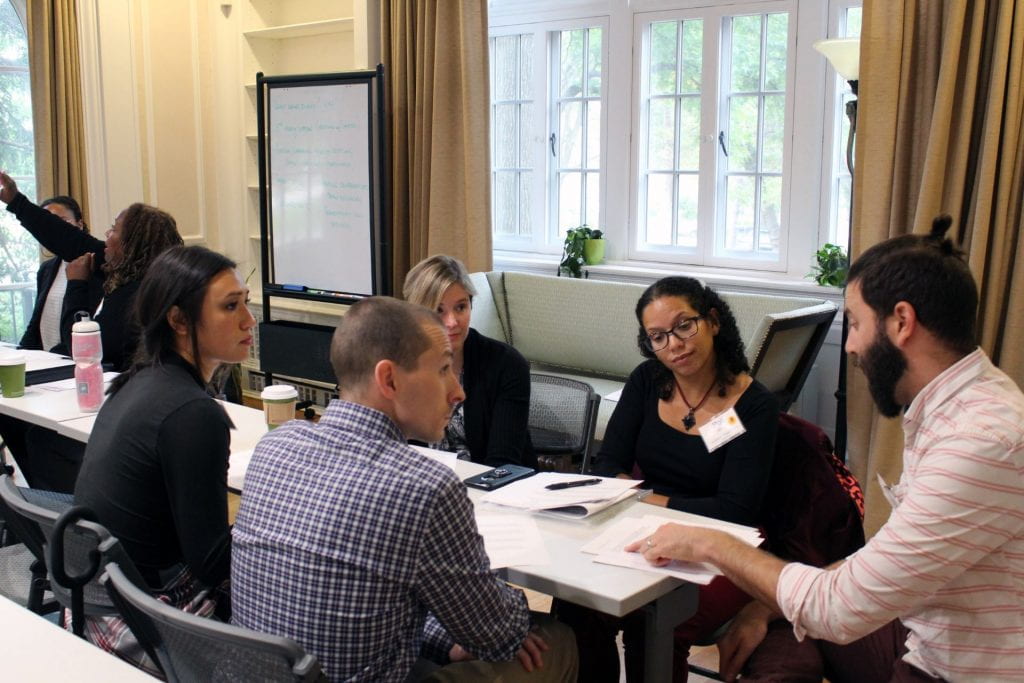In October of 2019, the Gephardt Institute collaborated with the Center for Community Health Partnership and Research at the Institute for Public Health, the Office for Socially Engaged Practice at the Sam Fox School of Design & Visual Arts, and University of Missouri Extension to hold an introductory workshop on group facilitation for campus and community leaders. The objective of the workshop was to foster sustainable collaborations between staff, faculty, and community partners by developing and enhancing facilitation skills.
Poli Rijos, Manager for the Center of Community Health Partnership and Research, AB ’03, MSW ’05, chaired the planning committee and met monthly with co-planners to develop content for partners interested in community engaged research and practice. “We had conversations with a range of stakeholders,” she explained, “and they expressed a need for more support in this area.” She and other planners sent targeted invitations with the goal of enhancing existing partnerships and helping those partners become better facilitators of community engaged processes.
40 participants and 8 facilitators attended the day of presentations, discussions, group activities, and personal reflection. Sarah Caldera Wimmer, MSW ’14, joined as a representative of LifeWise STL, a nonprofit organization whose mission is to help individuals and families achieve economic well-being by providing high-impact, relationship-based programming and by addressing system barriers to their success. “I was invited as a result of my participation in Pitch Partners and another collaborative project,” she shared. “I was excited to dedicate a morning to learn together with respected colleagues and have a base knowledge for our work moving forward.”
The workshop facilitators guided participants through a four-step process for effective group facilitation: invitation, planning, steering, and reflection. For each step in the process, participants were guided to think both theoretically and practically about what collaborative and engaged facilitation looks like. For example, during the content section on planning, groups of participants worked together to plan a hypothetical neighborhood meeting about community and university partnerships.
Liz Kramer, Associate Director for the Office of Socially Engaged Practice, BS ’08, co-facilitated the planning section. “I have taught facilitation workshops in other settings,” she shared, “and I enjoyed bringing resources and past experiences to the group. One of the things that most interested me about this was all of the curiosity about making facilitation work more accessible. Accessibility comes from both the logistics, as well as from creating a process that people can and want to sustain participation in.” Liz continued, “I hope participants gained appreciation for the difficulty and needed time investment to really craft a collaborative, facilitated process. This appreciation helps people to seek out support when they want to pursue initiatives that involve people from a range of backgrounds and experiences.”
When asked if she felt the workshop objective was met, Sarah said yes and emphasized the importance of having an intentional space to develop knowledge and skills that are often assumed. “We are starting an interdepartmental trauma-informed workplace committee at my agency,” she added, “and I will use the templates provided to ensure everyone is on the same page.” Dr. Christopher Prater, Assistant Professor in Medicine and Pediatrics at WashU, echoed Sarah’s sentiments: “It was well-designed, and the breakout sessions provided tools for incorporating the skills needed to achieve facilitation goals. I will utilize the training as we apply for funding to scale up on a pilot project through which community members receive training to lead home education on the prevention and diagnosis of tuberculosis.”
A post-workshop evaluation revealed that participants left with a greater understanding of a variety of techniques and skills for developing meeting agendas, action planning, asset mapping, stakeholder analysis, evaluation, and more. Participants also reported an improved grasp of skills related to listening and gathering new voices, building trust and implementing clear group norms, and addressing conflict during group decision-making. Chris reiterated the importance of listening skills: “Listening and hearing each other’s ideas is a critical part of community health research. It seems simple, but it’s often easier to think your own ideas are the best way to accomplish goals whereas the ideas of community partners are actually better solutions because they, too, are experts.”
The workshop’s facilitators also benefited from the experience. According to Liz, “The workshop reminded me of the range of places where strong facilitation skills are needed, and the need to continue to grow in the skills of facilitation, and particularly facilitation to navigate oppressive power dynamics.” Poli agreed, saying, “Workshops enhance our skills as facilitators. We get used to doing what is easy or familiar, but effective facilitation and partnership-building take time and an understanding of the goals and what works best for all involved.”
The Gephardt Institute, Center for Community Health Partnership and Research, Office for Socially Engaged Practice, and University of Missouri Extension will come together again on March 4 for a Lunch and Learn series event titled, “Know Your Level of Community Engagement: Conflict Resolution.” Participants will learn how to diagnose conflict, apply a problem-solving approach to conflict, and facilitate and moderate challenging conversations. To learn more and register, click here.
